 | |
|
An up close and personal interview with U.S. Army Veteran and Togetherweserved.com Member:
SSG Doug Warden U.S. Army (1966-1973)
WHAT INFLUENCED YOUR DECISION TO JOIN THE MILITARY?
My dad was a World War II veteran of the Army Air Corps. One of his brothers served with the 1st Cavalry Division in Korea. On my mother's side of the family, her brother served in the Army in Germany during the cold war. It wasn't a question of whether  I would go to the military, but when? I had no choice as to joining the military. I would go to the military, but when? I had no choice as to joining the military.
I played all the sports at Prague Oklahoma High School. I wasn't big enough for football, but I did start as an end on the varsity team. I had several 20 plus point games on the basketball team and was the catcher. I didn't have a girlfriend and no prospects for dating.
I went to junior college in eastern Oklahoma and played basketball, but I quit. I was tired of being broke all the time. We practiced basketball three times a day. They didn't feed me enough in the cafeteria and I didn't have money to buy a hamburger late a night, so I decided that I would get a job, any job. I was still 17 when I quit college, so it was hard to find a job that paid anything.
When I turned 18, I got a job at Tinker Air Force Base in Oklahoma City tearing down jet engine exhaust manifolds. It was nasty work. But made enough to have a '62 Chevrolet Super Sport and I lived in a nice apartment. All that ended when I received my draft notice in April, 1966, just a few days after turning 19. I remember thinking at the time that two years was an eternity. But I was determined to do my best and put in my two years and get out and go back to college.
I was drafted into the United States Army in Shawnee, Oklahoma, on June 28,1966. At the Armed Forces Center in Oklahoma City, they lined us up alphabetically. They took the first 50 to be draftees into the Marine Corps. It's the first time in my life that I was glad that my last name started with a "W".
WHAT WAS YOUR SERVICE CAREER PATH?
I was told in basic training by the cadre that since my test scores were high and I could type over 60 words per minute that I would become a company clerk. When the list was posted on the company bulletin board with our MOS selection, I had to ask someone what 11B stood for. I was not happy being assigned as a light weapons infantryman. When I learned it was a light infantryman, I was not at all happy. After AIT (Advanced Infantry Training) at Fort Ord, California, I was assigned to an infantry unit in Germany. My squad won the squad Army Training Test and we were given a four day pass (the only pass I ever received in the Army).
While in this unit I got in trouble when I attempted to recover a shirt off a guy who had stolen it out of my locker. I saw him wearing it in the mess hall and asked him to let me see the laundry mark. When he wouldn't take it off, I punched him in the face and knocked him down and started taking it off him. About 5 of his buddies jumped me and the sergeants had to break it up. He had stolen my fatigue shirts, but my platoon sergeant put me on extra duty for a month. After that, he was on me for the slightest misstep on my part.
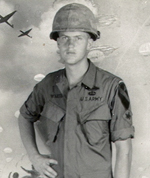 I had enough one day after coming off a stint on all night guard duty and I went down to the orderly room and filled out Form 1049 to volunteer for duty in Vietnam. I saw it as the only way out of a bad situation, but I think deep down, that I wanted to see if I could do the real thing. I had enough one day after coming off a stint on all night guard duty and I went down to the orderly room and filled out Form 1049 to volunteer for duty in Vietnam. I saw it as the only way out of a bad situation, but I think deep down, that I wanted to see if I could do the real thing.
I was assigned to C Company, 1st Battalion, 12th Cavalry, 1st Cavalry Division at An Khe, Vietnam in May, 1967. All of us new guys were sent to "Charm School", the three day orientation course where they tell you to forget everything that you learned in training, because this was a "different" kind of war. A Medal of Honor recipient, SSG Delbert O. Jennings, who was in C Company at the time, took all us new guys to the field.
For the next ten and a half months I was a rifleman, RTO (radio telephone operator) for my platoon leader and company commander, then a squad leader and a platoon sergeant. When the platoon was without a lieutenant, I spent about a month and a half as platoon leader.
I got out as a Staff Sergeant with 22 months service and 5 months time in grade. I really didn't know what I had accomplished. I turned 21 years of age in April and went home on May 1, 1968.
I was really unhappy with my civilian job and applied for the Oklahoma City Police Department and was accepted and offered a job. The only drawback was that maternity benefits didn't kick in until you had been on the job nine months and we had just found out that my wife was pregnant with our first child. It cost about $600 to have a baby back then and it just as well have been $10,000. I had spent all my savings on a car and a wedding. One day I attended the Oklahoma State Fair with my wife and sister and saw an Army Recruiting tent. I went in and told the guys there that if I could keep my rank, I would go back in. I had been out about 16 months and was under the impression that you lost a stripe if you were out over 90 days and re-enlisted. The recruiter told me that the rules had changed and a former soldier could be out for as much as 30 months and go back in at their former rank. I talked with my wife about it and she agreed, only if I would stay out of the infantry.
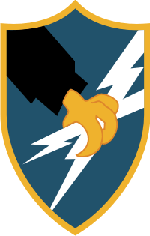 I chose the Army Security Agency and soon I was back in and waiting for a security clearance at Ft. Devens, Massachusetts. I became a Signal Intelligence Analyst and got orders for Germany. Nothing against the ASA, but I realized that I was a field soldier at heart and in the wrong place, so I volunteered for the ASA's Special Operations Detachments that were attached to various Special Forces Groups around the world. I was accepted and was soon on my way to the 400th Special Operations Detachment, 1st Special Forces Group (ABN) on Okinawa. I worked toward getting my Special Forces qualification by going through Special Forces Proficiency Training at Camp Hardy, Okinawa and I worked on a Special Forces "A" Team in B Company, commanded by Lt. Colonel King. I provided communications for Colonel John Geraci, the Group Commander, during riot control in 1971 and 1972. I chose the Army Security Agency and soon I was back in and waiting for a security clearance at Ft. Devens, Massachusetts. I became a Signal Intelligence Analyst and got orders for Germany. Nothing against the ASA, but I realized that I was a field soldier at heart and in the wrong place, so I volunteered for the ASA's Special Operations Detachments that were attached to various Special Forces Groups around the world. I was accepted and was soon on my way to the 400th Special Operations Detachment, 1st Special Forces Group (ABN) on Okinawa. I worked toward getting my Special Forces qualification by going through Special Forces Proficiency Training at Camp Hardy, Okinawa and I worked on a Special Forces "A" Team in B Company, commanded by Lt. Colonel King. I provided communications for Colonel John Geraci, the Group Commander, during riot control in 1971 and 1972.
I was going through the jumpmaster course at the Sukiran Training Area, Okinawa in July, 1972 and on the third day, I was to make two jumps from the 34 foot tower, one "Hollywood" (no equipment) and one with equipment. On my "Hollywood" jump, I exited the tower and the cable snapped in two. Colonel Geraci told me in the hospital that my accident had caused all the jump towers, all over the world, to be shut down for inspection. The accident caused a crushed right wrist and severe injury to my back. I was in the hospital for three weeks. The medical staff told me that I could not jump any more, so I told them I wanted out. I was medevaced to Ft. Sam Houston, Texas and retired with disability in March, 1973.
DID YOU PARTICIPATE IN COMBAT OPERATIONS? IF SO, COULD YOU DESCRIBE THOSE WHICH WERE SIGNIFICANT TO YOU?
I was regularly in combat in the Vietnam War. On my second day in the field, I stood up between a heavily armed VC (Viet Cong) and a fellow platoon member that he was trying to kill and took him out. Three days later, my 27 man platoon rode on two tanks into the village of An Que, north of Bong Son. Unknowingly, we drove right into the center of the CP (Command Post) of the 22nd NVA (North Vietnamese Army) Regiment. We were trapped all day and when the rest of the company tried to come to our aid, they were forced back. We were on our own. By midday there were only a couple of us who could still fight. It was my first day as RTO for the platoon leader. We lost 1 killed and over 20 wounded. Our company received a Valorous Unit Award for that battle which occurred from May 31 through June 1, 1967. I had been in the field for five days and had been put in for a Bronze Star w/V, a Silver Star and a Purple Heart.
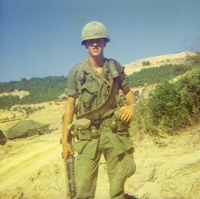 From late May to mid September, 1967, I was a Radio Telephone Operator for my platoon leader and company commander. In September, I returned to the 3rd platoon and became a squad leader. We participated in operations in Kontum, Dak To and the Bong Son Plain. On December 15, 1967, we ran into the 22nd NVA Regiment again, this time near Tam Quan, north of Bong Son. It turned into a two day battle. We lost so many guys, killed and wounded, that we were ordered back to take over the "Green Line" (base perimeter defense) around the 1st Cavalry Division headquarters at An Khe. From late May to mid September, 1967, I was a Radio Telephone Operator for my platoon leader and company commander. In September, I returned to the 3rd platoon and became a squad leader. We participated in operations in Kontum, Dak To and the Bong Son Plain. On December 15, 1967, we ran into the 22nd NVA Regiment again, this time near Tam Quan, north of Bong Son. It turned into a two day battle. We lost so many guys, killed and wounded, that we were ordered back to take over the "Green Line" (base perimeter defense) around the 1st Cavalry Division headquarters at An Khe.
In January, 1968, we moved north about 200 miles to clear the area around Camp Evans. On the day of Tet (31 Jan 1968), we were air assaulted in company strength to just south of Quang Tri. My squad was on the first ship. The NVA were on the march coming in from the south to attack Quang Tri on Highway 1 in broad daylight. They shot out the windshield on our helicopter and the pilot told me to get everybody off. My six guys and I were on the ground in the middle of an NVA Regiment for several hours alone because the flight of helicopters carrying the rest of our company were diverted. The helicopters that were armed with ARA (Aerial Rocket Artillery) really saved our lives. They flew continuous cover and kept the NVA from overrunning us. Our battalion commander landed and took three of my guys back to LZ Sharon, near Quang Tri, and then returned for the last four of us.
My platoon sergeant was wounded that day, so I became platoon sergeant for the next 16 days that we were in contact with the retreating NVA. They were tough soldiers. On February 19th, I was wounded by rifle fire in the hip while I was directing machine gun fire at the NVA. I couldn't be medevaced until the next day. When I got to the rear medical aid station, the wound was infected and I was put a regimen of shots. I never returned to field since my DEROS (Date Eligible for Return from Overseas) was only about a month and a half away.
WHICH, OF THE DUTY STATIONS OR LOCATIONS YOU WERE ASSIGNED OR DEPLOYED TO, DO YOU HAVE THE FONDEST MEMORIES OF AND WHY?
 I really liked being stationed at Ft. Devens, Massachusetts, because I'm a history buff and I enjoyed visiting Salem, Plymouth and Boston. There is so much history to be seen in the area. I was surprised by the small size of states back in the Northeast. Ayre, Massachusetts and Rhode Island was only 12 miles south and New Hampshire was 13 miles north. I really liked being stationed at Ft. Devens, Massachusetts, because I'm a history buff and I enjoyed visiting Salem, Plymouth and Boston. There is so much history to be seen in the area. I was surprised by the small size of states back in the Northeast. Ayre, Massachusetts and Rhode Island was only 12 miles south and New Hampshire was 13 miles north.
The Freedom Trail in downtown Boston was my favorite place to visit. The walk was just over two miles and started at the Old State House and the Old North Church, along with Paul Revere's silver shop, went past Breed and Bunker Hill and ended at the place where Old Ironsides was moored.
After my training tower accident on Okinawa, my old platoon leader, Bob Radcliffe, wrote me and invited me to take three days leave with him in Thailand. He was a major with the 46th Special Forces Group. He and I spent several days at a resort on the southern part of Thailand called Pattaya. We relaxed in a five bedroom bungalow that cost us $8 per day. We talked about old times in Vietnam and went out for Thai food each night in some of the best restaurants.
FROM YOUR ENTIRE SERVICE CAREER WHAT PARTICULAR MEMORY STANDS OUT?
 It was the birth of my two children. My son, Rob, was born in1970 in an old World War II hospital at Ft. Devens. There was no waiting room and I was ordered to go home and they would call me when he arrived. It was the birth of my two children. My son, Rob, was born in1970 in an old World War II hospital at Ft. Devens. There was no waiting room and I was ordered to go home and they would call me when he arrived.
My daughter, April, was born in 1971 at the Camp Kue, Okinawa Hospital. I got to stay in the room for her delivery and she was able to stay in my wife's room. I changed her first diaper and fed her for her first feeding. It was common practice for my unit to give the fathers of newborn infants a week off to help their wives get back on their feet.
WERE ANY OF THE MEDALS OR AWARDS YOU RECEIVED FOR VALOR? IF YES, COULD YOU DESCRIBE HOW THIS WAS EARNED?
I was awarded two Silver Stars, the Soldier's Medal, a Bronze Star w/V device, three Purple Hearts, the Army Commendation Medal and the Air Medal. I also received a unit award, the Valorous Unit Award, for the Battle of An Qui. I don't know who or why I was put in for all these medals because I was just doing my job. I also received a Combat Infantry Badge.
I got in several fights with other soldiers, the rest of my Army career, who didn't know me and looked at my uniform and accused me of buying my staff sergeant stripes and ribbons at the PX for show. Looking back on it now, I was a 20 year old staff sergeant with several rows of ribbons on my dress uniform and I probably looked like a "wanna-be" (phony). But it nevertheless upsets me when anyone accused me of falsifying anything on my uniform.
OF THE MEDALS, AWARDS AND QUALIFICATION BADGES OR DEVICES YOU RECEIVED, WHAT IS THE MOST MEANINGFUL TO YOU AND WHY?
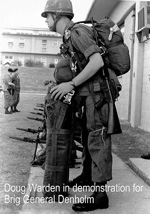 I am most proud of my Combat Infantry Badge (CIB) and the Parachutist Badge. The CIB puts me in company with the best fighting men America has to offer and I had to work my fanny off for the Jump Wings. I am most proud of my Combat Infantry Badge (CIB) and the Parachutist Badge. The CIB puts me in company with the best fighting men America has to offer and I had to work my fanny off for the Jump Wings.
WHICH INDIVIDUAL PERSON FROM YOUR SERVICE STANDS OUT AS THE ONE WHO HAD THE BIGGEST IMPACT ON YOU AND WHY?
There's no question about this, it was 1st Lieutenant Robert F. Radcliffe, West Point Class of 1965.
He refused to see me as I really was, a young, naive screw-up. Instead he started making me believe that I could be a combat leader. He went out of his way to teach me everything he had learned in Ranger School and from his service with the 82nd Airborne Division. He taught me to read the difficult maps we had of triple canopy jungle, how to call in artillery, how to lead patrols and most importantly, to lead from the front. Radcliffe went on to have a distinguished military career that spanned 26 years. He retired as a full bird Colonel serving as the Inspector General of the Recruiting Command.
He and I have stayed in touch through the years and he has become one of my best friends.
CAN YOU RECOUNT A PARTICULAR INCIDENT FROM YOUR SERVICE THAT WAS FUNNY AT THE TIME AND STILL MAKES YOU LAUGH?
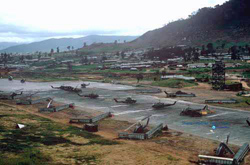 On duty around the "Green Line" at An Khe, the base camp of the 1st Cavalry, we were pretty bored pulling bridge duty. Another guy and I agreed to have a fast draw contest using the pistols that we borrowed from our machine gunners. I emptied mine, outdrew him and dry fired. He didn't unload his pistol and shot at me. The bullet missed me by inches and went into the sand bags stacked behind me. I threw my pistol at him and chased him for a long while, but could never catch him. I finally cooled down and it was funny after the fact. On duty around the "Green Line" at An Khe, the base camp of the 1st Cavalry, we were pretty bored pulling bridge duty. Another guy and I agreed to have a fast draw contest using the pistols that we borrowed from our machine gunners. I emptied mine, outdrew him and dry fired. He didn't unload his pistol and shot at me. The bullet missed me by inches and went into the sand bags stacked behind me. I threw my pistol at him and chased him for a long while, but could never catch him. I finally cooled down and it was funny after the fact.
WHAT PROFESSION DID YOU FOLLOW AFTER THE SERVICE AND WHAT ARE YOU DOING NOW? IF CURRENTLY SERVING, WHAT IS YOUR CURRENT JOB?
 I worked as music store manager, a sports equipment salesman, built Dobro Guitars and eventually went to work for Southwestern Bell in 1978. I worked as music store manager, a sports equipment salesman, built Dobro Guitars and eventually went to work for Southwestern Bell in 1978.
I finally graduated in December 1980 from Webster University, St. Louis, Missouri, with a BA in Management. In all, I spent 15 years with AT&T, working my way up to a senior manager in Oklahoma, Missouri and Texas.
My next job was with Gartner, Inc., a high tech consulting company, based in Stamford, Connecticut. For the ten years I had held that job, I traveled the country as a technical consultant from my home in Oklahoma. I retired in 2006, one month short of my 60th birthday.
After I retired I became the historian for the 12th Cavalry Regiment Association as well as one of the officers on the board. I also wrote a book about my experiences in Vietnam entitled "Boy Sergeant."
WHAT MILITARY ASSOCIATIONS ARE YOU A MEMBER OF, IF ANY? WHAT SPECIFIC BENEFITS DO YOU DERIVE FROM YOUR MEMBERSHIPS?
I am a life member of the 1st Cavalry Division Association, the Special Forces Association, the 12th Cavalry Regiment Association, the Military Order of the Purple Heart and the Disabled American Veterans. I have been able to connect with some of my closest combat friends through these organizations.
HOW HAS MILITARY SERVICE INFLUENCED THE WAY YOU HAVE APPROACHED YOUR LIFE AND CAREER?
I learned in the military that I was just as smart and savvy as anyone else and better than many. It gave me a confidence that I could do anything, and do it well.
I became a senior manager at AT&T. I started with AT&T as a non management salesman 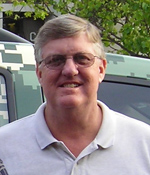 at age 30. I set a goal to be a District Manager by the time I have been there 5 years. It took me 6 years, but I made it. at age 30. I set a goal to be a District Manager by the time I have been there 5 years. It took me 6 years, but I made it.
I was working in Dallas Texas as an Area Manager when my daughter miscarried her first baby and my mother became terminally ill. I took an early retirement to return home to Oklahoma. I was there for both of my daughter's children's births and I was holding my Mom's hand when she died. I've never regretted my decision to leave AT&T.
Since I had a lot of experience in telecommunications, networking and Information Technology, I interviewed for a job with Gartner, Inc.in 1996. I had an office in my home and usually flew out of Oklahoma City on Monday and returned home sometime on Friday. I did that for almost 10 years. My service connected disabilities worsened and I finally retired in 2006.
WHAT ADVICE WOULD YOU HAVE FOR THOSE THAT ARE STILL SERVING?
I would tell anybody to stay motivated. Always attach yourself to someone and something that is going to demand that you improve and do your best on a continual basis. Don't settle for any job or any unit that can't keep you challenged. Never, never, rest on your laurels.
IN WHAT WAYS HAS TOGETHERWESERVED.COM HELPED YOU MAINTAIN A BOND WITH YOUR SERVICE AND THOSE YOU SERVED WITH?
I was encouraged to join this site by Danny Long, a fellow Charlie Company, 1st/12th soldier. He came in country about two years after I left C Company. I've found that even though we didn't serve together, we are all part of the Charlie Company family.
I have made contact with many other veterans that I hold in the highest regard. It's been a wonderful experience.
|
|
|
Share this Voices Edition on:



 |
|
TWS VOICES
TWS Voices are the personal stories of men and women who served in the US Military and convey how serving their Country has made a positive impact on their lives. If you would like to participate in a future edition of Voices, or know someone who might be interested, please contact TWS Voices HERE.
This edition of Army Voices was supported by:
Army.Togetherweserved.com
For current and former serving Members of the US Army, US Army Reserve and US Army National Guard, TogetherWeServed.com is a unique, feature rich resource helping Soldiers re-connect with lost Brothers, share memories and tell their Army story.
To join Army.Togetherweserved.com, please click HERE.
|
|